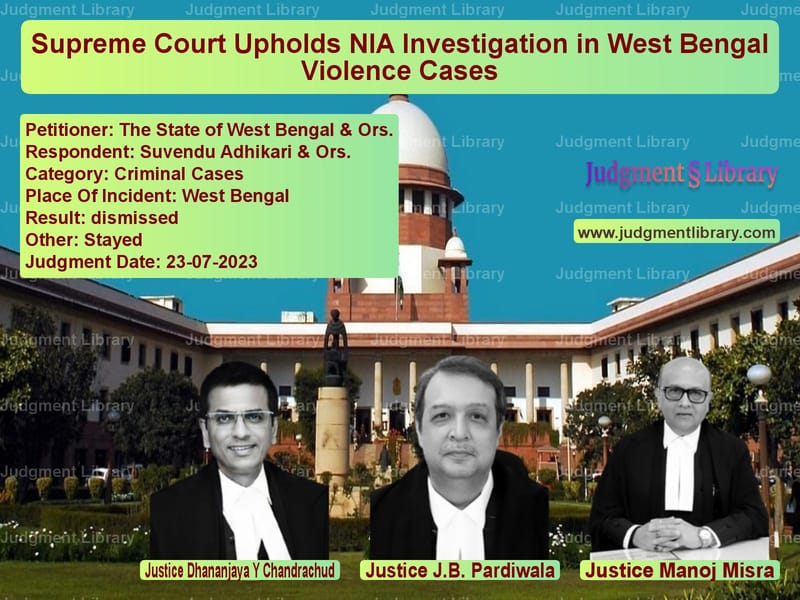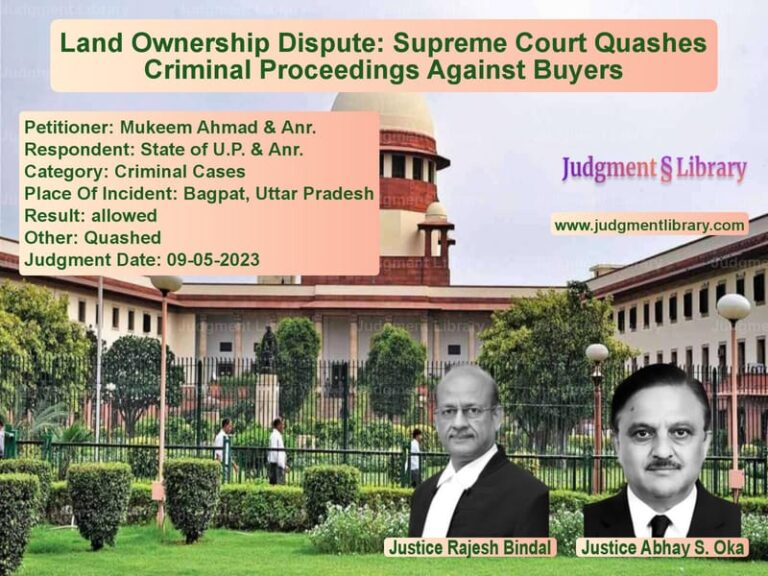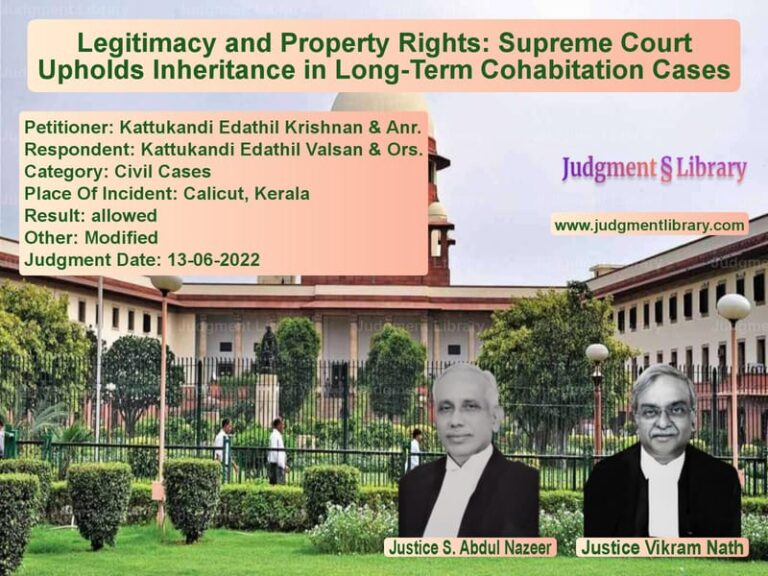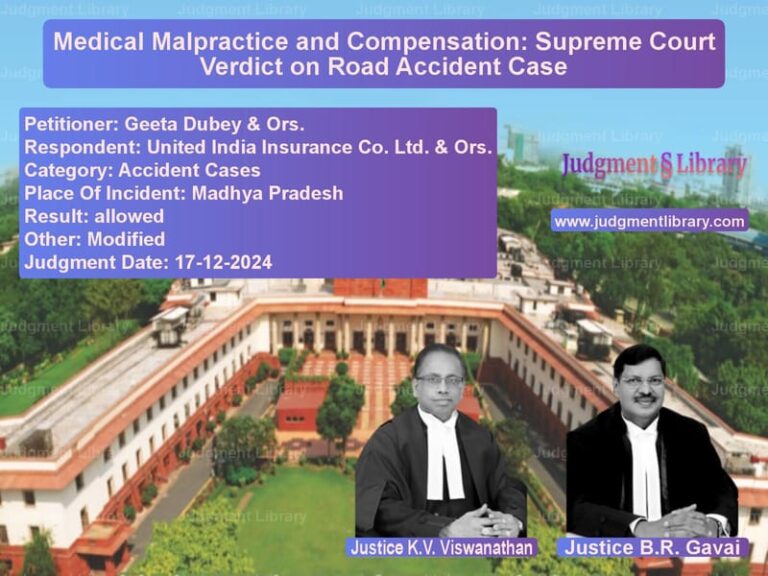Supreme Court Upholds NIA Investigation in West Bengal Violence Cases
The case of The State of West Bengal & Ors. v. Suvendu Adhikari & Ors. is a significant ruling by the Supreme Court concerning the transfer of criminal investigations to the National Investigation Agency (NIA). The Court upheld the Calcutta High Court’s order directing the transfer of multiple first information reports (FIRs) to the NIA for further investigation. The ruling reinforces the authority of the central government to intervene in cases involving national security and the use of explosives.
Background of the Case
The case arose from multiple violent incidents in West Bengal, particularly during the Ram Navami processions in March-April 2023. The State police registered six FIRs concerning incidents that involved allegations of arson, rioting, and the use of explosives. The FIRs were registered across different locations, including:
- Shibpur, Howrah (FIR Nos. 113/2023 and 114/2023)
- Dalkhola (FIR No. 78/2023)
- Serampore (FIR Nos. 141/2023 and 144/2023)
- Rishra (FIR No. 48/2023)
Following public outcry and concerns over the handling of the cases, a Public Interest Litigation (PIL) was filed before the Calcutta High Court. The petitioners argued that the incidents involved the use of explosives and warranted an investigation by the NIA under the Explosive Substances Act, 1908 and the National Investigation Agency Act, 2008.
Read also: https://judgmentlibrary.com/supreme-court-acquits-man-in-murder-case-due-to-lack-of-evidence/
On April 27, 2023, the High Court ruled in favor of the petitioners, directing the State police to transfer all FIRs, documents, and evidence to the NIA. The West Bengal government challenged this order in the Supreme Court.
Key Legal Issues
- Did the High Court have the authority to transfer the investigation to the NIA?
- Did the incidents involve offenses under the Explosive Substances Act, 1908, warranting an NIA investigation?
- Was the State police competent to handle the investigation independently?
Petitioner’s (State of West Bengal) Arguments
The State government, represented by senior counsel, opposed the High Court’s order, arguing:
- The violence did not involve the use of explosives that would warrant an NIA probe.
- The injuries sustained by victims were minor abrasions, inconsistent with a bomb blast.
- All four seizure memos from the incidents appeared to be in the same handwriting, suggesting fabrication.
- The State police were actively investigating the cases and had arrested multiple individuals.
- Transferring the cases to the NIA would demoralize the State police and interfere with their jurisdiction.
Respondent’s (NIA and Original Petitioners) Arguments
The NIA, supported by the original petitioners, countered:
- The incidents involved the use of explosives, bringing them within the ambit of the NIA Act.
- Section 6 of the NIA Act mandates that the State must report such offenses to the Central government.
- The High Court had correctly identified lapses in the State’s investigation.
- The Center had already issued a notification under Section 6(5) of the NIA Act, taking over the cases.
Supreme Court’s Observations
The Supreme Court carefully examined whether the High Court had correctly ordered the transfer of the cases to the NIA.
On the Authority of the High Court
The Court ruled that the High Court was well within its jurisdiction to order the transfer. It stated:
“The High Court, in its extraordinary jurisdiction, was justified in directing the transfer of investigation to the NIA, given the nature of the allegations.”
On the Use of Explosives
The Supreme Court emphasized that allegations under the Explosive Substances Act necessitated an NIA probe. It observed:
“Where an offense falls within the scheduled offenses under the NIA Act, the Central Government is empowered to direct the NIA to investigate.”
On the Role of the State Police
The Court acknowledged that the State police had taken steps but held that their actions did not preclude an NIA probe:
“The power of the Central Government under Section 6(5) of the NIA Act is independent of the State Government’s findings. The NIA is not constrained to rely solely on reports from the State.”
Final Judgment
The Supreme Court dismissed the appeals filed by the West Bengal government, affirming the High Court’s order. The ruling directed:
- The State police must hand over all case files, documents, and seized materials to the NIA immediately.
- The NIA should proceed with its investigation without interference.
- The High Court’s observations were limited to the validity of the NIA’s jurisdiction and would not prejudice the investigation.
Implications of the Judgment
This landmark ruling has significant implications:
- Strengthening Central Oversight: The judgment reinforces the NIA’s role in cases involving explosives.
- Judicial Clarity on NIA’s Powers: The ruling clarifies that the Center can direct NIA investigations independently.
- State Police Accountability: The decision ensures that politically sensitive cases are investigated impartially.
Conclusion
The Supreme Court’s decision in The State of West Bengal v. Suvendu Adhikari reaffirms the role of the NIA in cases involving national security threats. By upholding the High Court’s order, the ruling ensures that serious offenses, such as those involving explosives, are thoroughly investigated by a central agency. This judgment sets a precedent for the timely intervention of the NIA in cases where State investigations may be inadequate.
Petitioner Name: The State of West Bengal & Ors..Respondent Name: Suvendu Adhikari & Ors..Judgment By: Justice Dhananjaya Y Chandrachud, Justice J.B. Pardiwala, Justice Manoj Misra.Place Of Incident: West Bengal.Judgment Date: 23-07-2023.
Don’t miss out on the full details! Download the complete judgment in PDF format below and gain valuable insights instantly!
Download Judgment: the-state-of-west-be-vs-suvendu-adhikari-&-o-supreme-court-of-india-judgment-dated-23-07-2023.pdf
Directly Download Judgment: Directly download this Judgment
See all petitions in Terrorist Activities
See all petitions in Judgment by Dhananjaya Y Chandrachud
See all petitions in Judgment by J.B. Pardiwala
See all petitions in Judgment by Manoj Misra
See all petitions in dismissed
See all petitions in Stayed
See all petitions in supreme court of India judgments July 2023
See all petitions in 2023 judgments
See all posts in Criminal Cases Category
See all allowed petitions in Criminal Cases Category
See all Dismissed petitions in Criminal Cases Category
See all partially allowed petitions in Criminal Cases Category







